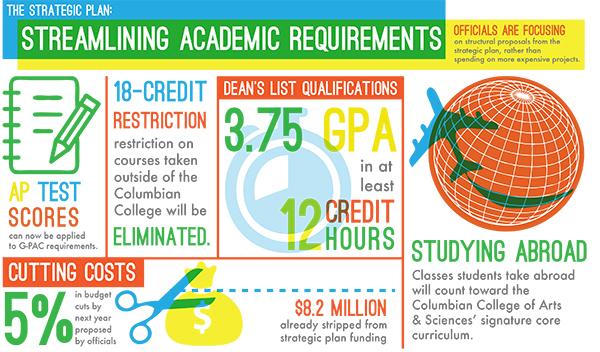GW is looking to cut bureaucratic barriers to earning a degree – a win for students that also helps officials roll out new but inexpensive parts of its strategic plan amid a University-wide budget crunch.
Administrators are focusing on implementing changes proposed in the strategic plan that they say will streamline students’ academic experiences and make it easier for them to graduate on time. It comes after officials had to scale back parts of the 10-year plan and delayed spending millions of dollars because of budget problems.
Over the past year as part of the strategic plan, GW’s largest school, the Columbian College of Arts and Sciences has made changes to its signature core curriculum, called G-PAC, and tweaked which study abroad credits it accepts.
Making changes to requirements and which study abroad courses count toward a degree cost the University little, while other initiatives like launching new research centers or hiring more faculty have been more significant financial undertakings.
Randall Packer, the chair of the biology department, said changes that simplify students’ requirements are “very positive” for the University overall because they are cost-effective. He added that administrators can work toward the goals laid out in the strategic plan without sending the University into more debt.
“When we don’t have a lot of money laying around, we’ve got to try to do things that don’t cost money and this is something that does not cost any money, at least at the outset,” Packer said. University officials have called for nearly all divisions to cut their budgets by 5 percent next year.
Unlike restructuring, some changes proposed in the plan would require more funding, like $30 million worth of new interdisciplinary research centers. The University also committed to putting aside $50 million to $100 million for new faculty who study in multiple fields in the original plan.
Last month, Provost Steven Lerman announced the University would have to cut back on funding for new strategic plan programming to keep existing programs running. Earlier this year, he said they stripped $8.2 million from strategic plan funding.
Provost Lerman said the changes in the Columbian College mark a move toward the overall goal of simplified course requirements. He declined to comment on how the policy change would fit in with the University’s general cost-cutting push.
“The undergraduate associate deans have focused on ways to simplify various rules and create consistency across schools in an effort to create a more unified undergraduate educational experience,” Lerman said.
Colleges and universities have come under more scrutiny for how successful they are in having students complete their degrees. Graduation rates are one factor the federal government could use in its college ratings system, which is expected to be outlined later this year.
Lerman said Senior Vice Provost for Academic Affairs and Planning Forrest Maltzman has worked with associate deans to outline how the University can create common courses across schools, another goal outlined in the strategic plan.
“This group will continue to meet and discuss other avenues to offer improvements on our students’ educational experience both inside and outside the classroom and I look forward to seeing their recommendations,” Lerman said.
Last month, the University also announced that students will be allowed to count AP scores and classes they take abroad toward the Columbian College of Arts and Sciences’ G-PAC curriculum. CCAS faculty also approved the elimination of the 18-credit restriction on professional credit courses taken in GW schools outside of the Columbian College.
Dan Ullman, the college’s associate dean of undergraduate studies, said changes to course credits will “afford students flexibility” in choosing and registering for courses.
“These CCAS changes are part of a campus-wide effort to encourage undergraduate study across disciplines and schools. Where possible, we want to relax rules that may restrict options and flexibility for our students,” Ullman said in an email.
Director of Study Abroad Rob Hallworth said in an email that students will have more options when choosing a study abroad program because they will be able to transfer credits to their core curriculum requirements.
“The ability to take G-PACs abroad broadens the course choices students have when selecting a program,” Hallworth said in an email.
The globally focused strategic plan also calls for saving a total of $9 million over the next 10 years by shedding partnerships with study abroad companies that rack up too many costs for students, cutting office expenses and “realigning” the programs’ price structures.
The plan also calls for creating new ways to save money, such as bond refinancing, using utilities more efficiently and not renewing the leases on rented buildings like 2020 K St. and 1776 G St.
Olivia Martinez, a political communication major in the School of Media and Public Affairs, said beginning college without having to fulfill core curriculum classes would have been a “game changer” because she earned more than 30 credits through AP classes and could have used the opportunity to study abroad.
Martinez is graduating a full year early, but she has to take classes this summer, which she would not have done had her AP credits from high school counted for G-PAC.
“It would have helped me get more out of my GW experience. I could have taken more interesting classes or more interesting experiences,” Martinez said.
Robin Eberhardt and Mary Ellen McIntire contributed reporting.








